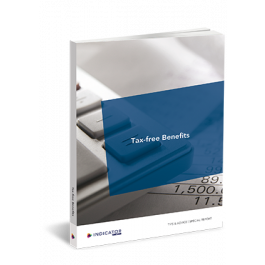Tax-free Benefits
A Tips & Advice Special Report about...
In a nutshell
This Special Report shows you how to take full advantage of a range of tax and NI-free benefits. It contains numerous tips on how to put the HMRC-approved schemes into practice. Plus, it tells you which traps to watch out for. With this Special Report at hand, you can start saving tax on benefits in no time!
In detail
There's a wide choice of HMRC-approved schemes, but the rules can be tricky to follow. If you don't stick to them, HMRC can cancel the savings you'd hoped to achieve. That's why we created this Special Report for you. It covers a wide range of tax-free benefits and explains:
- How each exemption works
- What the exemption covers
- What conditions must be met
- How much tax/NI can be saved
You'll also get a stack of complementary documents to download in support of your claim to tax-free status.
We've created this Tips & Advice Special Report especially for...
Company owners and managers, payroll/personnel staff, in-house accountants that want to:
- Take full advantage of tax and NI-free benefits
- Implement tax efficient benefits for their employees
- Save tax and cut costs
Tax advisors that want to:
- Safely reduce their clients' tax bills by using HMRC-approved schemes
You'll get the following free extras with this Tips & Advice Special Report...
An online service with ready-to-use documents
- To immediately apply our advice and solutions in practice
- That you can easily adapt to suit your own requirements
In this Tips & Advice Special Report you'll read about...
1. Making tax-free benefits available to employees
1.1. Can we provide employees with tax and NI-free benefits?
1.2. What type of benefits can be provided tax and NI free?
1.3. Will providing additional benefits increase our wage bill?
1.4. How does a salary sacrifice scheme work?
1.5. How can we ensure that a salary sacrifice arrangement is effective?
1.6. What should we tell our employees about a salary sacrifice scheme?
1.7. Is the cost of providing tax-free benefits to our employees deductible from our profits?
2. Benchmark rate subsistence payments
2.1. What are benchmark subsistence payments?
2.2. What are the conditions for a payment to qualify as tax and NI exempt?
2.3. What if more than the benchmark rate is paid?
2.4. How do we negotiate a higher rate of tax and NI-free subsistence payments?
2.5. What’s the position for subsistence payments made under a working rule agreement?
3. Childcare
3.1. What type of childcare is covered?
3.2. How does the exemption for workplace nurseries work?
3.3. Can we provide tax and NI-free childcare in a nursery or with a childminder instead?
3.4. Can we use vouchers to help with employees’ childcare costs?
3.5. How does the £55 per week limit work?
3.6. When did the tax and NI exemption for employer-supported childcare end?
3.7. Is the new Tax-free Childcare (TFC) scheme more tax efficient for employees?
4. Christmas parties and annual functions
4.1. What are the tax-free limits on parties?
4.2. How is the cost per head figure calculated?
4.3. What’s the position if we have more than one function in a year?
4.4. What’s the position for online functions?
5. Cycle to work schemes
5.1. What is the cycle to work scheme?
5.2. What’s covered by the tax exemption?
5.3. Does the exemption apply to e-bikes?
5.4. Do we have to monitor our employee’s private use of the bike?
5.5. How do marketed cycle to work schemes work?
5.6. How much tax and NI can be saved?
5.7. Can we deduct the cost of the bikes in calculating our profits?
5.8. What happens if the employee wants to buy the bike at the end of the agreement?
6. Eye tests and spectacles
6.1. Are eye tests tax free?
6.2. Are there any conditions that must be met?
7. Home-to-work travel
7.1. Can we provide free bus travel for employees to get to and from work?
7.2. What’s a works transport service?
7.3. What sort of vehicle qualifies?
7.4. Can we use the bus for other purposes?
7.5. What about subsidising a local bus service to provide transport for our employees?
7.6. What are the conditions?
7.7. Can we give our employees a voucher to use the service?
8. Employer-provided equipment and homeworkers
8.1. Can we provide employees with equipment without triggering a taxable benefit?
8.2. Temporary exemption for 2019/20 to 2021/22
8.3. Is there a tax charge if we pay our employee’s energy etc. costs?
9. Incidental overnight expenses
9.1. What are incidental expenses?
9.2. Can payments be made tax free?
9.3. What is the “overnight stay” condition?
9.4. What is the exemption limit?
10. Living accommodation
10.1. In what circumstances can we provide tax and NI exempt living accommodation?
10.2. What type of jobs can meet the “proper performance” test?
10.3. What’s the “better performance” test?
10.4. How is the “customary to provide” accommodation applied?
10.5. What counts as necessary security purposes?
10.6. Where we provide accommodation, what is the position if we pay for related services?
11. Long service awards
11.1. What type of award can be made?
11.2. Are there any restrictions on the type of award that we can make tax free?
12. Medical check-ups and treatment
12.1. When is the cost of a medical check-up tax and NI exempt?
12.2. Are there any conditions to this exemption?
12.3. Is there an exemption for providing medical treatment?
12.4. Are there special rules for employees who have been off work long term because of illness?
13. Meals
13.1. When are free or subsidised meals for employees exempt?
13.2. Is food for employees where they attend a lunchtime meeting covered by the exemption?
13.3. We also provide tea and coffee. Surely we don’t need to tax that?
14. Mileage allowance payments and passenger payments
14.1. What are mileage allowance payments?
14.2. What does the exemption cover?
14.3. What is the approved amount?
14.4. Do the same rules apply for NI purposes?
14.5. What happens if the amount we pay is less than the approved amount?
14.6. How can we make best use of the exemption for MAPs?
14.7. What are passenger payments?
14.8. What does the passenger exemption cover?
14.9. What is the approved (exempt) amount for passenger payments?
14.10. What about NI and passenger payments?
15. Mobile telephones
15.1. What is the exemption for mobile telephones?
15.2. Can we just pay the bill on the employee’s behalf?
15.3. Does the exemption cover smartphones?
16. Overseas accommodation and subsistence allowances
16.1. When can we pay fixed rate tax and NI-free allowances for foreign travel?
17. Relocation costs
17.1. What is covered by the exemption?
17.2. Is there a monetary limit on the provision of tax-free relocation costs?
17.3. What type of costs fall within the scope of the exemption?
17.4. What are acquisition benefits and expenses?
17.5. What are abortive acquisition benefits and expenses?
17.6. What are disposal benefits and expenses?
17.7. What about the costs of transporting belongings?
17.8. What travelling and subsistence expenses fall within the exemption?
17.9. Which domestic goods may be replaced within the terms of the exemption?
17.10. Does the exemption apply to all employee moves?
17.11. Is there a time limit in which the move must take place and the expenses incurred?
17.12. What’s the position in relation to bridging loans?
18. Recreational and sporting facilities
18.1. What is covered?
18.2. What are the conditions for exemption?
18.3. Is membership of a local gym covered by the exemption?
18.4. What other exclusions from the exemption are there?
19. Suggestion scheme awards
19.1. What exemption applies to suggestion schemes?
19.2. What type of awards can we make?
19.3. Is there a limit?
19.4. What happens if we make more than one financial benefit award?
19.5. What happens if the awards are spread over several years?
19.6. Is there a limit to the number of tax-free encouragement awards that we can make?
20. Transport home for employees who work late
20.1. When could this exemption be used?
20.2. What are the late working conditions?
20.3. What are the car-sharing failure conditions?
21. Termination benefits
21.1. When does an exemption apply to termination payments?
21.2. What’s covered by the £30,000 exemption?
21.3. Is redundancy pay exempt?
21.4. What steps must you take for termination payments in excess of the £30,000 limit?
21.5. What counts as exempt for counselling etc. payments
21.6. What type of retraining costs can be paid tax and NI free?
22. Training
22.1. Is employer-paid-for training exempt from tax?
22.2. What type of training counts as work-related?
22.3. Do leadership or team building courses come within the exemption?
22.4. Can we reimburse training costs incurred by a potential employee?
22.5. To qualify for exemption, do we need to send employees on external training courses?
22.6. What about related costs of training?
22.7. Are travel, subsistence and other costs covered by the exemption?
23. Workplace parking
23.1. Is parking exempt from tax?
23.2. What counts as workplace parking?
23.3. What happens if the local council levy a charge for workplace parking?
24. Electric vehicle charging
24.1. What is the tax position if we provide free electric charging for employees’ vehicles?
24.2. What terms and conditions apply to the exemption?
24.3. Does the charging have to take place on the firm’s premises?
25. Trivial benefits
25.1. What are trivial benefits?
25.2. What are the conditions?
25.3. What is the special limit for directors?
26. Minor benefits
26.1. What are minor benefits?
26.2. What is covered by the exemption?
26.3. Are there any exclusions?
27. Pensions advice
27.1. What is the employer-provided pensions advice exemption?
27.2. When can the exemption apply?
27.3. What are the conditions?
28. Appendices
28.1. Website details of cycle-to-work scheme partners
28.2. Consider a PAYE settlement agreement
You can choose from the following options...
Paper
- The hard copy version
- Keep it on your desk or use it whenever you're offline
Digital
- The PDF-version
- Delivered to your inbox
Take a look at your options below.
Special subscribers' offer
£90.00
£70.00
Only if you already have a subscriptionStandard offer
£90.00
Special subscribers' offer
£90.00
£70.00
Only if you already have a subscriptionStandard offer
£90.00

Got a question? Call Customer Services
(01233) 653500


 (01233) 653500
(01233) 653500 







